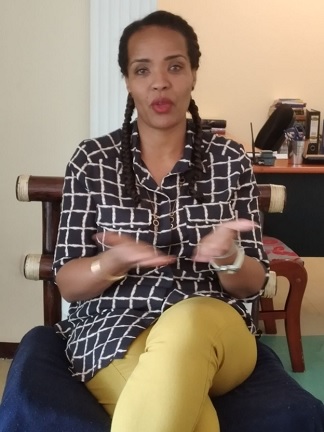
An eight year-old girl passing by across the street saw a destitute boy whose leg was severely bleeding. She saw the people around him putting soil on his wound. With her pure innocence and deep care at that age, she prayed sincerely saying ‘God, please give me money; so that I can buy shoe for disadvantaged children!’
This is the first and real life incident that sparked the idea of charity in the mind of Sabrina Orgino. Growing up in family foster care herself, Sabrina did not slide any opportunity that brought her childhood dream to reality. She started her charitable activities when she was only 16. Every school break, she started returning to her home country and supporting over 16 children.
She said though the hardship that the 16 children went through was hard to bear, the challenges that the two kids were in, literally became the main reason for the establishment of her charity organization ‘Joyfullife Ethiopia’ (Special Needs Daycare Center).
Sabrina is a Founder and Managing Director of Joyfullife Ethiopia. She is also a Special Need Educator, Lawyer and Human Rights Activist.
The Ethiopian Herald has stayed with Sabrina to talk about her journey in making the joyfullife Ethiopia a reality. Enjoy reading.
Can you walk us through your journey in establishing ‘Joyfullife Ethiopia’ (Special Need Daycare Center)?
Even though the idea of supporting others and engaging in charitable activities was my childhood dream, the time that I was introduced to two children, of the sixteen children, was a turning point.
Prior to issuing for a license, I used to provide the children with school materials. After that, I discussed with the school principal so that the kids would get food from the school and paid their monthly expense; and then I returned to my second country.
Fortunately, during my break here in Ethiopia, I met someone who actually ended up directing and recommending me to issue a license, organize a board member and establish a charity organization.
Before retuning, I finalized all the process including assigning two volunteers who would check on the 16 children. So, I almost did everything going back and forth on my summer break.
Did you face any difficulty once you started supporting the children under the organization?
Honestly speaking, the constraint started from issuing a license. Apart from the bureaucracy that was tiresome, the maladministration that I encountered in each district was hard. The problem was that the civil servants there were selfish enough to put their personal interests first by putting aside the main issue which is supporting the children.
Moreover, both the parents of the beneficiaries as well as the civil servants used to leave every responsibility of supporting the kids to the organization. Such challenges pushed me to return the license.
Which one of the two approaches (as an individual or as an organization) is more suitable for the children?
From 2006-2009, I supported the children the usual way. But I believe that the children would benefit more if they are under the umbrella of an organization. This is because that, under a legal organization, their safety, and rights would be highly respected.
Not only the children but the government would also benefit. Besides collecting taxes from the organization, it would be easier for the government to inspect and control maladministration problems such as corruption.
What do you think is the psychological problem that special need children face?
I also grew up as a special needs child. As a special needs person myself, the
challenges that we face in all walks of life are multifaceted. Of the six children in our family, I was the only special needs child. So, growing up, I had to go through tough situation and hearing harsh comments.
Given the awareness gap that our society has regarding special needs, special needs children are considered cursed. They are mostly isolated by the society even in their families. I was considered the lazy one in my family as well as in my class room.
Fortunately, my foster care family was able to identify my problem and hired three professionals to assist me with my education and other aspects of life, which helps me to be where I am today. But most people are not privileged to have such family especially in developing countries.
Can you mention the services that you provide in your Special Needs Daycare Center?
Previously, we were engaged in supporting over 128 children, covering the school materials and other expenses but once the government started school feeding program and fulfilling school materials for public school students, we are now fully engaged in the Special Needs Daycare Center.
Apart from supporting the children, there is a psychosocial support program we hold every three months with the mothers of the special needs children. Since the mothers are the ones who are mostly responsible and look after their children, they get discouraged due to the feedback they get from the society.
What is your take on policy and its implementation regarding (children) special needs?
The only problem that lies in the country is not with the availability of the policy but with the implementation. Priority must be given in exerting utmost effort in putting the set policy in to effect.
On the other hand, the government must engage the society to bring about sound solutions. However, more work is needed to correct the wrong perception that the society has towards special needs.
It is also important to understand that every child with disability should get his/her right respected just like the rest of the children without disabilities. Moreover, apart from engaging investors, awareness creation activities must be carried out in public institutions as well as the society.
Thank you very much!
You are welcome!
BY BETELHEM BEDLU
The Ethiopian Herald March 24/2022





